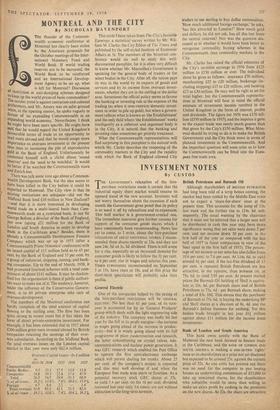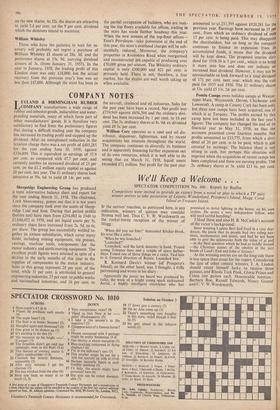IN VESTMENT NOTES
By CUSTOS
THE Government's relaxation of the hire- ". purchase restrictions made it certain that the industrial equity share market would resume its upward trend in the new account. Investors will not worry themselves about the recession if each month the Government gives proof that its policy is to ward it off by relaxations and re-expansion. This bull market is a government-created one. The immediate measures give further reasons for support of the consumer goods shares which I have consistently been recommending. News has yet to come, as I write, about the hire-purchase relaxations Of GREAT UNIVERSAL STORES. I recom- mended these shares recently at 23s. and they are now 24s. 3d. ex ls. 3d. dividend. There is still scope for a rise, especially as an increased demand for consumer goods is likely to follow the 3+ per cent. to 4 per cent. rise in wages and salaries this year. TIMES FURNISHING recommended on September 5 at 15s. have risen to 18s. and at this price the short-term speculators will probably take their profits.
General Electric
One of the companies helped by the easing of the hire-purchase restrictions will be GENERAL ELECTRIC. No less than 61 per cent. of its turn- over is accounted for by its 'General Products' group which deals with the light engineering side of the industry. The company was badly hit last year by the fall in its profit margins-the increase in wages going ahead of the increase in produc- tivity-but it is wisely going ahead with its full programme of plant modernisation and research, the latter concentrating on crystal valves, tele- communications and nuclear power generation. It was GEC research which enabled the Post Office to operate the first semi-electronic exchange which Will permit dialling for trunks. About 25 per cent. of the company's output is exported and this may well develop if and when the European free trade area starts to function. As a potential recovery stock GEC shares at 37s. to yield 5.4 per cent. on the 10 per cent. dividend (covered last year only 1.6 times) are not without attraction to the long-term investor.
British Petroleum and Burmah Oil Although shareholders of BRITISH PETROLEUM had long been told of a scrip bonus coming, the market had been misled by the Middle East crisis not to expect a 'share-for-share' issue at the present time. This accounts for the jump of 1 1 s. last week and the further rise to 114s. 6d. sub- sequently. The usual warning by the chairman that it must not be inferred that a larger sum will be distributed in cash this year may have more significance seeing that net sales were down 3 per cent. and net income down 30 per cent. in the first half of the year as compared with the last half of 1957 (a fairer comparison in view of the Suez upset in the first half of 1957). The percen- tage of net income to net sales has also fallen from 10.6 per cent, to 7.6 per cent. At 114s. 6d. to yield around 41 per cent. if 'the tax-free dividend of 15• per cent, is repeated British Petroleum are less attractive, in my opinion, than BURMAH OIL at 75s. 6d. to yield 5.95 per cent. At present market prices the Burmah Oil holding of Shell is equiva- lent to 10s. 4d. per Burmah share and of British Petroleum to 73s. 6d. per Burmah share, making a total of 83s. 10d. This means that the purchaser of Burmah at 75s. 6d. is buying the underlying BP and Shell shares at a discount of 8s. 4d. and the Burmah's Indian business for nothing. Yet this Indian trade brought in last year £61 million against about 1 million for the income from investments.
Bank of London and South America
This bank owns jointly with the Bank of Montreal the new bank formed to finance trade in the Caribbean, and the BANK OF LONDON AND. SOUTH AMERICA is making a one-in-two 'rights' issue to its shareholders at a price not yet disclosed but expected to be around 25s. against the current price of 32s. As one critic has pointed out there, was no need for the' company to pay issuing houses an underwriting commission of £15,000 to- take up unwanted shares, for the. shareholders. who subscribe would be more than willing to make an extra profit by cashing in the premium on the new shares. At 32s. the share are attractive
on the new shares. At 32s. the shares are attractive to yield 5.4 per cent. on the 9 per cent. dividend which the directors intend to maintain.
William Whiteley Those who have the patience to wait for re- covery will probably not regret a purchase of William Whiteley £1 shares at 28s. 3d. and the preference shares at 13s. 9d. carrying dividend arrears of 3s. (from January 31, 1955). In the year to January, 1958, the trading profit of this London store was only £18,000, but the actual recovery from the previous year's loss was no less than £47,000. Although the store has been in the partial occupation of builders, who are mak- ing the top floors available for offices, trading in the store has made further headway this year. When the new tenants of the top-floor offices- Esso's Petroleum-take possession at the end of this year, the store's overhead charges will be sub- stantially reduced. Moreover, the company's properties in Avonmore Road when reorganised and reconstructed are capable of producing over £70,000 gross per annum. The Whiteley ordinary capital is only £500,000 and 821 per cent. is privately held. There is not, therefore, a free market, but the shares are well worth taking up when available.



































 Previous page
Previous page